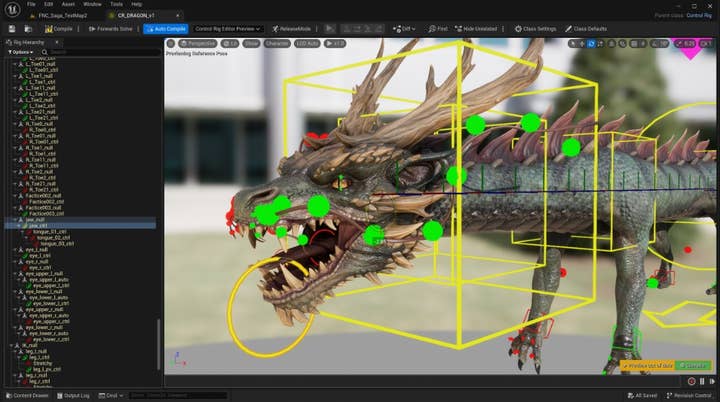Fortnite's evolution is delivering on metaverse dreams | Opinion
More than just a buzzword to Epic, the evolution of Fortnite is on the cusp of creating a genuine metaverse-esque platform with many millions of daily users
Sign up for the GI Daily here to get the biggest news straight to your inbox
On paper, a company announcing – in effect – that they're upgrading the modding tools for their online game should not be an industry-shaking event.
Sure, it's made more interesting when the game in question has generated revenues of around $30 billion in its five-year lifespan; any change at all to a behemoth on that scale is automatically of interest, after all. But even acknowledging that Fortnite is one of the most commercially successful games in history, it can be easy to miss just how important the link Epic just forged between the game and its Unreal Engine tools actually is – and the extent to which it could reshape a whole segment of the industry in the years to come.
It's hard to overstate what a cultural phenomenon Fortnite has been within its target demographics. Thinking of it as a hugely commercially successful game actually misses a lot of its success, which lies in its ability to evolve and develop in ways that go far beyond conventional definitions of a game.
Many people mentally file Fortnite away as simply being an immensely successful Battle Royale shooter, separated from similar rivals like Apex Legends or other online shooters like Overwatch simply by its success and ubiquity – but those comparisons miss out on key elements of what Fortnite has become to its creators and to many of its players.
Epic's 'metaverse' stands to make it not just one of the industry's most disruptive players, but one of the world's most important tech companies
Of course, all the high-profile experiments – like premiering movie trailers in the game, or hosting virtual concerts from major artists – doesn't change the fact that the Battle Royale shooter is still Fortnite's beating heart. That's what most of its players spend most of their time doing, for now at least – but even as they're doing so, they're often also engaged in an aspect that has become even more core to Fortnite's identity, namely that of an online social space to hang out with your friends.
The actual game most of us identify with Fortnite is just one facet of that – and Epic has made clear that it sees Fortnite increasingly evolving in that direction, with the competitive online shooter that spawned it becoming just one option for players to engage with in a much broader platform.
Most online games are social experiences to some degree, of course, and the most successful online games are generally defined by the quality of their social structures – World of Warcraft was a high watermark for many people in this regard. These are important social spaces for many players, but what Fortnite has accomplished in this space is unprecedented. There's a whole generation of gamers – many of them pretty casually engaged – for whom Fortnite is already a hub of their online socialising.
The game has leaned heavily into that role, focusing on building out functionality that provides for a lot of self-expression and social interaction, as well as creating opportunities for shared experiences – the aforementioned concerts and virtual movie theatres, for example, and even the evolving narrative and lore of the game's central island itself.
This is why, for all that most current discussion of the "metaverse" deserves a healthy dose of cynicism from the listener, it's worth listening carefully when Tim Sweeney (or anyone else from Epic) talks about it.

Unlike any other company that talks up a storm about the metaverse, Epic (which seems a little shy of the "metaverse" word itself at present, probably because it's been so badly stained in recent months by shysters and chancers of all stripes) has actually created an online 3D world where countless players spend hours every day hanging out, socialising, and playing. While most rivals bloviated about their cyberpunk fantasies and their honestly shocking inability to recognise that William Gibson's stories were meant to be cautionary in nature, Epic quietly went out and turned its successful online game into the closest approximation we've seen yet of an actual metaverse.
By effectively turning the Unreal Engine into a content creation system for Fortnite – or perhaps more accurately, by turning Fortnite into a gigantic online marketplace and play space for content created in the Unreal Engine – Epic is taking another pretty huge step in that direction.
Many see Fortnite away as simply an immensely successful Battle Royale shooter – but they miss key elements of what Fortnite has become
Tools for user-generated content (UGC) have existed for Fortnite before now – another reason why some people may underestimate the impact of this move, since it's not like they're opening the game up to UGC for the first time ever – but they were extremely basic and rough, especially by comparison with the Unreal tools. Letting people build UGC for Fortnite with Unreal tools is a huge step up that will enable entirely new kinds of creativity and interaction.
For starters, there's a whole universe of high-quality assets out there, including enormous libraries of assets created for games, movies, and TV shows, that can now be imported into Fortnite about as easily as dragging and dropping a file, and the software creators can now use to build interactions and experiences around those assets are essentially professional quality development tools.
It's not an exaggeration to suggest that user-created additions to Fortnite could effectively be high quality games in their own right. As the platform which will serve as host to those experiences, Fortnite is becoming more an ecosystem than a game.
The case for evolving this platform into something metaverse-esque is simple: Fortnite is real, it works, it's got millions upon millions of players, and its direction of travel has already led it a long way down this path towards being a multifaceted social space focused on shared experience and self-expression.
Unlike many of the metaverse pitches we've seen in recent years – many of which rely on VR headsets, and which often suggest use cases that don't appeal to anyone who isn't a hardcore metaverse evangelist to begin with – the description of what you'd actually do in Fortnite's metaverse makes sense and sounds, well, fun. Building on the play-centred socialising that defines Fortnite for many players already, Epic's experimentation with virtual concerts, real-time story events, and movie trailer premieres in the game have all been about trialling different things for players to do while they hang out with each other. UGC is a way to supercharge that experimentation and evolution.
Bluntly, the real killer apps for the metaverse are far more likely to emerge from some total unknowns trying out an off-the-wall new idea with free, readily available development tools, than they are to be created in a fluorescent-lit meeting room where one of the whiteboards is a big list of things the IP licensee says you can't do. The Battle Royale genre itself, from which Fortnite emerged and grew, is a perfect example of this principle at work; it's unsurprising that Epic wants to harness that creativity in its own burgeoning platform.
Fortnite isn't the only game that's pushing in this direction and trying to position itself as a broader platform – Roblox was arguably ahead of Epic in this process, although opening up the industry-leading Unreal toolset to Fortnite's UGC creators will put some pretty clear blue water between the two. Epic's apparent commitment to avoiding walled gardens, and working with competitors to build open and interoperable standards for their various metaverses, is also an interesting aspect that sets the company apart from its rivals.
The link Epic just forged between Fortnite and Unreal Engine... could reshape a whole segment of the industry in the years to come
That's actually a potential problem – a commitment to openness and interoperability is much less meaningful if nobody else is willing to come to the table with you, and Sweeney is right to fear that without more widespread commitment to openness, a company like Apple could essentially come along and steal everyone's lunch money. It will be interesting to see to what extent Epic can convince other companies with metaverse ambitions to go along with Sweeney's open, interoperable vision in order to fend off that risk.
Crystal ball gazing is never a particularly productive pastime in terms of technology trends – but after this week's announcements, it certainly seems unwise to place any bets against Fortnite becoming an increasingly important part of the games industry, both commercially and culturally.
Epic's ambitions to turn the game into a major platform have never been more clear. Microsoft has spent years essentially trying to transition Xbox from being a hardware platform to effectively being a gaming software and services platform that is hardware agnostic, and we can now see that Epic is coming towards a similar destination from the opposite end of things, transitioning Fortnite from being a popular online game to being a hardware-agnostic software and services platform that plays host to a wide variety of games, social spaces, and other experiences.
If that approach works, Epic's "metaverse" stands to make it not just one of the industry's most important and disruptive players, but one of the most important tech companies in the world.
Sign up for the GI Daily here to get the biggest news straight to your inbox

